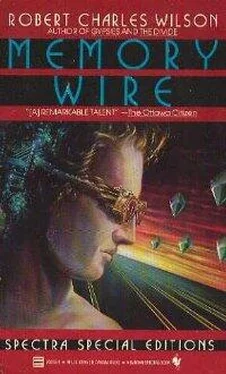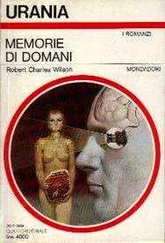Robert Wilson - Memory Wire
Здесь есть возможность читать онлайн «Robert Wilson - Memory Wire» весь текст электронной книги совершенно бесплатно (целиком полную версию без сокращений). В некоторых случаях можно слушать аудио, скачать через торрент в формате fb2 и присутствует краткое содержание. Год выпуска: 1987, ISBN: 1987, Издательство: Bantam Spectra, Жанр: Фантастика и фэнтези, на английском языке. Описание произведения, (предисловие) а так же отзывы посетителей доступны на портале библиотеки ЛибКат.
- Название:Memory Wire
- Автор:
- Издательство:Bantam Spectra
- Жанр:
- Год:1987
- ISBN:978-0-553-26853-9
- Рейтинг книги:4 / 5. Голосов: 1
-
Избранное:Добавить в избранное
- Отзывы:
-
Ваша оценка:
- 80
- 1
- 2
- 3
- 4
- 5
Memory Wire: краткое содержание, описание и аннотация
Предлагаем к чтению аннотацию, описание, краткое содержание или предисловие (зависит от того, что написал сам автор книги «Memory Wire»). Если вы не нашли необходимую информацию о книге — напишите в комментариях, мы постараемся отыскать её.
Memory Wire — читать онлайн бесплатно полную книгу (весь текст) целиком
Ниже представлен текст книги, разбитый по страницам. Система сохранения места последней прочитанной страницы, позволяет с удобством читать онлайн бесплатно книгу «Memory Wire», без необходимости каждый раз заново искать на чём Вы остановились. Поставьте закладку, и сможете в любой момент перейти на страницу, на которой закончили чтение.
Интервал:
Закладка:
Thinking of her, he followed the boardwalk along the margins of this canal, a right-of-way between the old float shanties standing like stilted birds above the water. He thought about Teresa.
She betrayed very little. It was wounding, the way she hid herself from him. Since her stone trance in Belem, she had been withdrawn, subtly lifeless, would turn away when he touched her. Her eyes were often on Keller, but Keller was equally distant: as if some weird electricity had put an opposite spin on the two of them. Something had passed between them, he thought, that time in the hotel room on the Ver-o-Peso. Some intimacy too awful to sustain.
The pain of it was obvious.
And yet she clung to the oneirolith. She had smuggled it back in her hand luggage, and she kept it concealed now in a Salvation Army dresser at the back of the balsa. Token of something. Her past, her future.
He had grown to hate it.
He hated it for the sadness it had created in her, and he hated it as a token of his own past. There were times when his life had seemed to him like one prolonged act of sleepwalking. Drafted out of a career college in the midwest, he had volunteered for Angel duty. The Psych Corps said he had “an aptitude for the work.” And maybe that was true, maybe he did. Maybe that was why, when his duty tour ended, he chose to have his socket pulled. A feeling that it was in some way too easy, that he could have continued to stumble through life in a pleasant fog of wu-nien —like Keller—or worse, ended up with a joychip plugged into his socket. He and a couple of war buddies had come to the Floats under the tutelage of a former CO named Trujillo, who wanted help setting up a drug lab. Byron pulled out at the last minute: he could not picture himself synthesizing enkephalins and rogue adenosines for a population of degraded addicts. He was attracted to the dream-stones, however, because they seemed comparatively wholesome, and because they were popular with the artists beginning to make their presence felt in the Floats. He contacted Cruz Wexler, who set him up in business. It was simple and lucrative work but in time it began to press his conscience. He acquired a respect for the strangeness of the ’liths. They possessed a healing power, possibly a darker power as well. He came to question the wisdom of selling them as one more feelgood drug to the moneyed mainlanders who came down to the tamer Float clubs every Saturday night. Buy a dreamstone from the Angel vet: it was daring, it was fashionable. He overheard his name in conversations. “Probably had his balls shot off in the war,” one of his clients said. And the dreadful thing, he realized, was that it might be true, his life in the Floats might be one more variation on the theme of wu-nien, a kind of castration. In some important way he had been neutered.
Teresa was his road back into the world.
He had not consciously chosen her for the role, nor was it entirely coincidence. Some mingling of the two. She showed up at his door, because she needed him; he fell in love with her, because he needed to fall in love.
There had never been any question of indifference. Some telegraphy in the shape of her face or the color of her eyes had communicated her necessity to him. She was emaciated and ill; he was a demobbed Angel, a parody of a combat vet. It should have been comical. But he cared for her.
But she was dying.
The stone saved her life, and that was good; it did not occur to him until much later to wonder whether he had merely postponed the inevitable. She really did want to die. He learned that about her. She was punishing herself for some sin she could not even consciously remember, some buried enormity lost in the trauma of the fire. But there were other forces in her, too, and he was certain he had kindled one of them: a spark of resistance, her rebellious desire to live. It was as if there were two Teresas woven between and around each other, each working to deceive and subvert the other: death tricked into life, life into death.
In all this the oneirolith remained a mystery, a conduit between these fractions of herself, necessary but dangerous. He had been afraid of the deep-core stone because it threatened to upset a delicate balance, and that was what it had seemed to do: the spark in her was all but extinguished now.
And so there was nothing to do but find this place for her to hide, a pontoon shack in the Floats where she would be safe, at least, from the Agencies. She might pull out of it. He told himself so.
But what angered him—and it was a deep and profound anger he wasn’t certain he could control any longer—was Keller’s coolness toward her.
Keller, whom she loved. Keller, who could have saved her.
Keller wanted to go back to the mainland.
He met Keller at a market stall and they walked out along the tidal dam in an awkward silence. “I’m finished here,” Keller said at last. “That must be obvious now.”
“She needs you,” Byron said simply.
He followed Keller’s gaze out beyond the boardwalk, past the featureless wall of the dam. Out there on the clean horizon a Thai tanker seemed to sit motionless. Gulls whirled overhead. “There’s nothing I can do for her.”
“You owe it to her to try.”
He shook his head. “I don’t owe her anything.”
There was some secret knowledge moving behind his eyes. Byron felt angry, excluded, helpless. He recognized Keller’s aloofness for what it was: the Ice Palace, Angel instincts, a cold and willful vacancy of the soul. Keller said, “I have a job to do.”
“Fuck your job.” They walked a few paces with this envelope of anger around them, not speaking. “You go back there,” he said finally, “it could be dangerous. The Agencies could find you.”
“I download, I put everything through an image processes I destroy the original memory trace. Even if they find me, there’s nothing that constitutes evidence. Nothing they can use against her.”
“You care about her that much?”
The question seemed to trouble Keller; he didn’t answer.
“If you cared,” Byron said, “you would stay.”
“I can’t.”
“So what then? A new name? Another job somewhere?”
He shrugged.
“You tell her,” Byron said wearily. “Leave me out of it. You tell her you’re leaving.” Keller said, “I will.”
2. She was at the back of the float shack watching TV.
Keller looked over her shoulder. It was some Scandinavian love serial, satellite programming syndicated through Network. But she wasn’t really watching. Her eyes were averted. She glanced up at him and they were alone for a moment in the silence of the small room, the floor lifting and falling in the swell. “You’re leaving,” she said.
It startled him. But she would have guessed. It was hardly surprising. The evidence of small silences, looks avoided, hands untouched. He made himself aloof: an act of will. “I have work to do,” he said.
She smiled faintly. “Downloading memories?”
He nodded.
“And then,” she said, “they’re video. Right? You don’t have to live with them anymore.” She stood up, ran a hand through her hair. “Will you come back?”
He was torn by the question. The odds were that he would not. A part of him wanted desperately never to come back, never to see her again. But he was not entirely free from adhyasa, powerful and traitorous impulses. “I don’t know.”
She- nodded, as if to say: all right, yes, thank you at least for being honest. She held out her hand and he took it. But when he moved to turn away, she held him there. Her gaze was intense and her hand tightened painfully. “It doesn’t matter,” she said fiercely. “Anything that happened, it doesn’t matter to me. What happened with Meg —it doesn’t matter.”
Читать дальшеИнтервал:
Закладка:
Похожие книги на «Memory Wire»
Представляем Вашему вниманию похожие книги на «Memory Wire» списком для выбора. Мы отобрали схожую по названию и смыслу литературу в надежде предоставить читателям больше вариантов отыскать новые, интересные, ещё непрочитанные произведения.
Обсуждение, отзывы о книге «Memory Wire» и просто собственные мнения читателей. Оставьте ваши комментарии, напишите, что Вы думаете о произведении, его смысле или главных героях. Укажите что конкретно понравилось, а что нет, и почему Вы так считаете.












